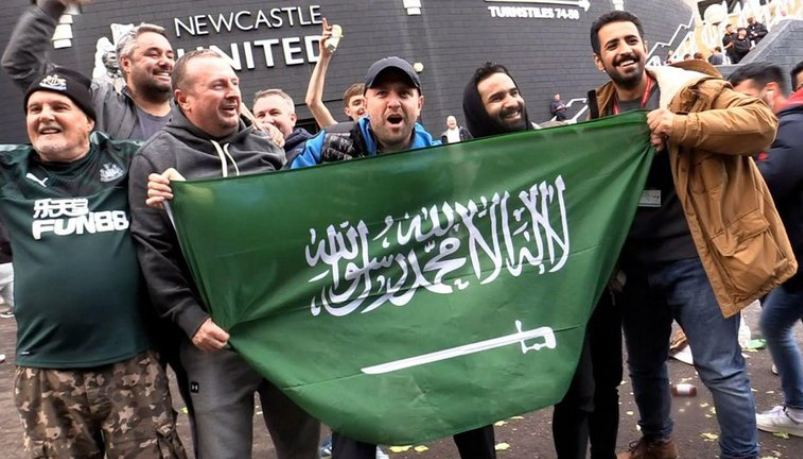Impact of Saudi Arabia’s Investments in Soccer
Newcastle United fans celebrate the club’s Saudi takeover by waving a Saudi flag outside St James’ Park.
Cristiano Ronaldo, the human cheat code in soccer, possesses abilities that make you wonder if he is even from this planet. Opposing goalkeepers are relieved if he only scores one goal against their team, with his cannon for a foot. In short, he’s a soccer alien and one of the best ever. Yet, Ronaldo has recently taken his talents to the top league in Saudi Arabia, signing a $210 million per-year contract with the club Al Nassr, making him the highest-paid soccer athlete of all time. How did an unknown team attract one of the biggest stars in the world? And more importantly, how could Saudi Arabia’s investments in soccer send ripple effects across the sports world?
I interviewed fellow senior and soccer fan, Griffin Straske, about the effects of Saudi Arabia investing in soccer. He found Ronaldo’s move to Al Nassr to be surprising and believes it could have negative consequences for the sport as a whole. “Who wouldn’t want that much money? His whole family and their future kids will be set for life,” he said. However, he also noted that “this is like Lebron James going to China because of money. Saudi Arabia could soon buy multiple superstars, causing clubs to pay more and hurting the competitiveness of the sport. Players are now playing for money, not trophies.” Many soccer fans, including Straske, are wondering what the next move for Saudi Arabia will be.
Saudi Arabia’s investments in soccer have had a significant impact on the sport both domestically and internationally. In the past decade, the country’s General Sports Authority (GSA) has invested heavily in the development of soccer infrastructure and clubs with the goal of improving the level of the sport in the country and increasing its competitiveness on the global stage. The Saudi Professional League (SPL), the top-flight league in the country, has been able to attract high-profile players, coaches, and investors, which has helped to improve the level of play and increase the competitiveness of the league.
One of Saudi Arabia’s first major investments in foreign clubs came in 2008, when a group of Saudi investors led by Sheikh Abdullah Al-Thani, the former head of the Qatar Football Association, purchased a 70% stake in French club Paris Saint-Germain. Since then, PSG has become one of the most powerful teams in France’s top league, winning eight league titles, attracting big-name stars like Lionel Messi in 2021, and becoming one of the best teams in the world.
More recently, in 2019, Saudi Arabia’s sovereign wealth fund, the Public Investment Fund (PIF), invested $337 million to acquire a 48% stake in Newcastle United Football Club, an English football club. In 2021, the PIF successfully purchased the club for a lofty sum of $409 million and currently has 80% ownership, with a further 10% going to property developers Simon and David Reuben and another 10% going to British investor Amanda Staveley’s PCP Capital Partners, according to CNBC.
The previous owner, British businessman Mike Ashley, had a controversial tenure as the owner of the club and had not invested enough in the club, which led to the club’s poor performance on the field and the disappointment of the fans. This acquisition faced some controversy and legal challenges from some groups. However, the club has seen success in competitions since then, and they are currently ranked third in the Premier League, the top league of English football, and are attracting big stars.
With groups of investors and the PIF splashing cash wherever they see fit, it has raised questions about where these large sums of money are coming from, as well as debate over whether they are legal. Many question whether the recent takeover of Newcastle United was an effort to whitewash the country’s reputation for human rights. Others worry about the political implications of the country’s involvement in foreign clubs. An author for the sports media group Sport Business Journal, Chris Smith, argues that Saudi Arabia’s investments in soccer are a way to showcase their ideology and improve their global reputation. A more recent example of this is seen in the Olympic games hosted in Russia and China, as well as the World Cup in Qatar. However, experts suggest that there is more to Saudi Arabia’s investments in soccer than just improving their global reputation. Instead, these investments are a small part of a larger strategy to make the country more globalized and welcoming to foreign tourism and investment.
Saudi Arabia’s investments in soccer have had a significant impact on the sport both domestically and internationally, establishing Saudi clubs and teams as major competitors for top talents on the global stage and boosting the country’s economy. However, there have been controversies and criticism over these investments, mainly related to covering up human rights issues, spreading political views, and financial motivations. As the country continues to invest in soccer, we can hope to see more exciting moments for the game and new heights for soccer. However, one must consider the potential costs, such as the impact on other clubs. The soccer world can only watch with a mix of delight and fear, as the influx of cash from Saudi investors may change the dynamics of the sport forever.
Hey everyone! My name is Henry Robertson. This year I will be an assistant sports editor to the amazing Sarah Cantor! I’m a junior and this is my first...






